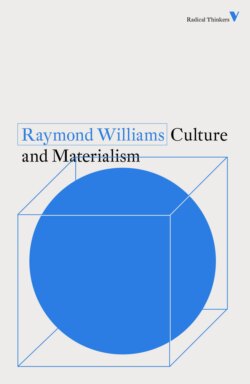Читать книгу Culture and Materialism - Raymond Williams - Страница 6
На сайте Литреса книга снята с продажи.
Publisher’s Note
Оглавление‘Selected essays’ are not uncommon in English-language culture, but their rationale as a form of publication is notably variable, and often indefinite. It may be pertinent, therefore, briefly to indicate our purpose in compiling Problems in Materialism and Culture.
Raymond Williams’s many books-from Reading and Criticism to Marxism and Literature-art well known and, with very few exceptions, widely available. What are less generally known and, for evident material reasons, not nearly so accessible, are the numerous essays that have accompanied them. Anticipating or developing the themes of the major works, augmenting them with more detailed studies or extending their methods into new areas of research, these essays are a crucial component of Williams’s writing as a whole, and it was in order to make them available to the wider readership of his full-length books that this volume was conceived.
The fourteen texts included here were chosen and arranged in the light of a related consideration. Many thousands of readers have encountered Williams’s major works as they appeared, in an intellectual acquaintanceship going back twenty years and more. But there is an increasing number for whom, inevitably, this is not the case. So large and complex a body of work can pose problems of access, for anyone – teacher or student, specialist or general reader – approaching it for the first time. It seemed important, therefore, that any selection of essays should aim to cover its entire range (apart from the novels), to compose a volume at once compact and representative.
Problems in Materialism and Culture has been designed to meet these requirements. The earliest of the essays dates from the period of The Long Revolution, having been written in 1958-59, the most recent from New Year, 1980. Their occasions are lectures and book-reviews as well as relatively independent and long-standing contexts of research. In mode the volume ranges from wholly abstract theoretical exposition to concrete historical analysis, from specialist research through collaborative dissent to engaged polemic. The subjects of discussion include literature and drama; theories of culture and of nature; dominant and subordinate, celebrated and marginal, forms of cultural production; structural features of late capitalist society and of the socialist order beyond it; the related political problems of contesting the one and constructing the other. The central theme – and practice – of the volume, already given in its title, is the elaboration within Marxist theory and socialist politics of a ‘cultural materialism’.
A Hundred Years of Culture and Anarchy, the opening essay of the book, looks back to illuminate a decisive and profoundly ambivalent moment in the emergence of English cultural criticism: Arnold’s response to the popular agitation of the late 1860s. Then follow a group of three studies in cultural theory: a tribute to Lucien Goldmann that discusses his work and meditates on its complex relations with received intellectual traditions in England; a re-examination of the concept of ‘base and superstructure’; and a theoretical analysis of means of communication. The next group of three essays is devoted to the problem of ‘nature’, as represented in the dominant humanist tradition; in the ideological formations, past and present, of Social Darwinism; and in the writings of the Italian Marxist Sebastiano Timpanaro. A fourth section brings together five concrete studies dealing successively with English naturalist theatre; the Bloomsbury group; advertising; utopianism and science fiction; and the Welsh industrial novelists. These exemplify the analytic programme of cultural theory.
Politics is the keynote of the fifth and last section of the volume. Here Williams reflects on the problematic history of Marxism in post-war Britain and on his own relation to it, and then, in a concluding essay on Rudolf Bahro’s Alternative, turns to consider the state of ‘actually existing socialism’–the comparable blockages of the instituted social order in the East and of the movement in the West–and to project a course beyond it, through the theory and practice of ‘cultural revolution’.
NLB
